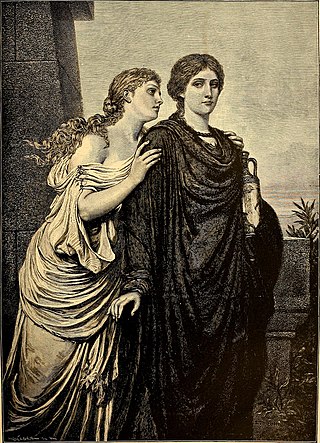
In Greek mythology, Ismene is a Theban princess. She is the daughter and half-sister of Oedipus, king of Thebes, daughter and granddaughter of Jocasta, and sister of Antigone, Eteocles, and Polynices. She appears in several tragic plays of Sophocles: at the end of Oedipus Rex, in Oedipus at Colonus and in Antigone. She also appears at the end of Aeschylus' Seven Against Thebes.

She Stoops to Conquer is a comedy by Oliver Goldsmith, first performed in London in 1773. The play is a favourite for study by English literature and theatre classes in the English-speaking world. It is one of the few plays from the 18th century to have retained its appeal and is still regularly performed. The play has been adapted into a film several times, including in 1914 and 1923. Initially the play was titled Mistakes of a Night and the events within the play take place in one long night. In 1778, John O'Keeffe wrote a loose sequel, Tony Lumpkin in Town.

The Changeling is a Jacobean tragedy written by Thomas Middleton and William Rowley. Widely regarded as being among the best tragedies of the English Renaissance, the play has accumulated a large amount of critical commentary.
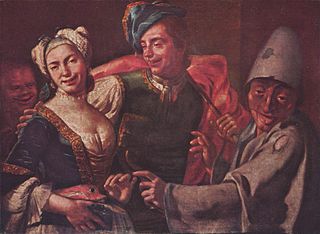
The Rover or The Banish'd Cavaliers is a play in two parts that is written by the English author Aphra Behn. It is a revision of Thomas Killigrew's play Thomaso, or The Wanderer (1664), and features multiple plot lines, dealing with the amorous adventures of a group of Englishmen and women in Naples at Carnival time. According to Restoration poet John Dryden, it "lacks the manly vitality of Killigrew's play, but shows greater refinement of expression." The play stood for three centuries as "Behn's most popular and most respected play."
The Witch is a Jacobean play, a tragicomedy written by Thomas Middleton. The play was acted by the King's Men at the Blackfriars Theatre. It is thought to have been written between 1613 and 1616; it was not printed in its own era, and existed only in manuscript until it was published by Isaac Reed in 1778.
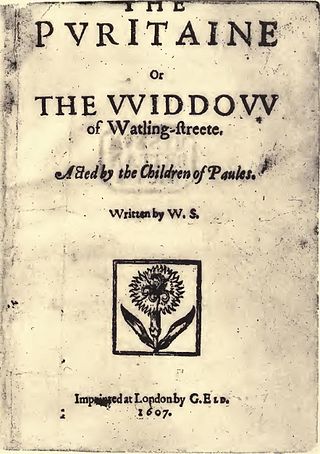
The Puritan, or the Widow of Watling Street, also known as The Puritan Widow, is an anonymous Jacobean stage comedy, first published in 1607. It is often attributed to Thomas Middleton, but also belongs to the Shakespeare Apocrypha due to its title page attribution to "W.S.".

Arabella, Op. 79, is a lyric comedy, or opera, in three acts by Richard Strauss to a German libretto by Hugo von Hofmannsthal, their sixth and last operatic collaboration.

Muchacha italiana viene a casarse is a 1971 Mexican telenovela by Televisa produced by Ernesto Alonso and directed by Alfredo Saldaña, starring Angélica María and Ricardo Blume. Writing credits belong to Delia González Marquez, Fernanda Villeli (adaptation), Marissa Garrido (adaptation), Miguel Sabido (adaptation) and Carlos Lozano Dana (adaptation)

The Roaring Girl is a Jacobean stage play, a comedy written by Thomas Middleton and Thomas Dekker c. 1607–1610.
No Wit, No Help Like a Woman's is a Jacobean tragicomic play by Thomas Middleton.
A Mad World, My Masters is a Jacobean stage play written by Thomas Middleton, a comedy first performed around 1605 and first published in 1608. The title had been used by a pamphleteer, Nicholas Breton, in 1603, and was later the origin for the title of Stanley Kramer's 1963 film, It's a Mad, Mad, Mad, Mad World.
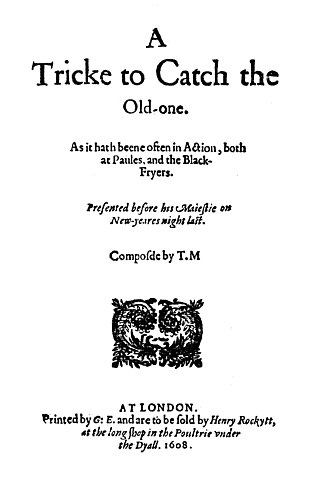
A Trick to Catch the Old One is a Jacobean comedy written by Thomas Middleton, first published in 1608. The play is a satire in the subgenre of city comedy.
More Dissemblers Besides Women is a Jacobean stage play, a tragicomedy written by Thomas Middleton, and first published in 1657.

The Constant Princess is a historical fiction novel by Philippa Gregory, published in 2005. The novel depicts a highly fictionalized version of the life of Catherine of Aragon and her rise to power in England.
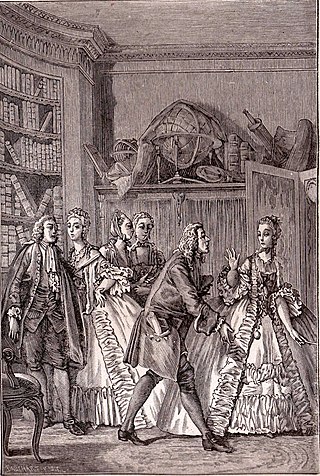
Les Femmes savantes is a comedy by Molière in five acts, written in verse. A satire on academic pretension, female education, and préciosité, it was one of his most popular comedies and the last of his great plays in verse. It premiered at the Théâtre du Palais-Royal on 11 March 1672. The character Trissotin, the main antagonist, is a caricature of Charles Cotin, an adversary of Nicolas Boileau and Molière, who both saw him as the perfect example of a pedantic scholar and mediocre scribbler.

La Traviata is a 1983 Italian film written, designed, and directed by Franco Zeffirelli. It is based on the 1853 opera La traviata with music by Giuseppe Verdi and libretto by Francesco Maria Piave. Soprano Teresa Stratas, tenor Plácido Domingo, and baritone Cornell MacNeil starred in the movie, in addition to singing their roles. The film premiered in Italy in 1982 and went into general release there the following year. It opened in theatres in the U.S. on April 22, 1983. The movie's soundtrack with James Levine conducting the Metropolitan Opera Orchestra and Chorus won a Grammy Award for Best Opera Recording.

Partenope is an opera by George Frideric Handel, first performed at the King's Theatre in London on 24 February 1730. Although following the structure and forms of opera seria, the work is humorous in character and light-textured in music, with a plot involving romantic complications and gender confusion. A success with audiences at the time of its original production and then unperformed for many years, Partenope is now often seen on the world's opera stages.
The Puppet Play of Don Cristóbal is a play for puppet theatre by the twentieth-century Spanish dramatist Federico García Lorca. It was written in 1931 and was first performed on 11 May 1935 at the Book Fair in Madrid, in a performance in which Lorca operated the puppets himself. Don Cristóbal is a kind of Punch character, who also appears in García Lorca's earlier puppet play, The Billy-Club Puppets.
The Busie Body is a Restoration comedy written by Susanna Centlivre and first performed at the Drury Lane Theatre in 1709. It focuses on the legalities of what constitutes a marriage, and how children might subvert parental power over whom they can marry. The Busie Body was the most popular female authored-play of the eighteenth century, and became a stock piece of most anglophone theatres during the period.
The Horse Lurja is a Georgian folktale published by Georgian folklorist Mikhail Chikovani. It tells the story about the friendship between a princess and a magic horse, which sacrifices itself for her after it rescues her from great peril. Although the tale appears in Georgia, some scholars recognize similar narratives in Central Asia and across Europe.












